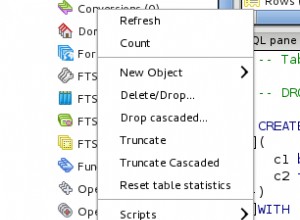Nie możesz sortować tablicy asocjacyjnej według wartości, ale musisz przekonwertować dane na inną strukturę danych i tam dokonać sortowania. Najłatwiej byłoby przekonwertować na inną tablicę asocjacyjną, w której klucze i wartości zamieniają się miejscami, ale wymaga to również, aby wartości kluczy były unikatowe.
Poniżej znajduje się przykład dostosowany do Twojej sprawy z Sortowanie kolekcji PL/SQL . Sprawdź ten artykuł, aby uzyskać szczegółowe informacje.
/* The sorting is done with SQL thus these types have to be SQL types. */
create type sortable_t is object(
continent varchar2(32767),
population number
);
/
create type sortable_table_t is table of sortable_t;
/
declare
type continent_population_t is table of pls_integer index by varchar2(32767);
continent_population continent_population_t;
i varchar2(32767);
sorted sortable_table_t := sortable_table_t();
begin
/* Populate original data. */
continent_population('Australia') := 30;
continent_population('Antarctica') := 90;
continent_population('UK') := 50;
continent_population('USA') := 50;
/* Convert to a helper data type that is used for sorting. */
i := continent_population.first;
while i is not null loop
sorted.extend(1);
sorted(sorted.last) := new sortable_t(i, continent_population(i));
i := continent_population.next(i);
end loop;
/* Show that the content is not sorted yet. */
dbms_output.put_line('Unsorted:');
for j in sorted.first .. sorted.last loop
dbms_output.put_line(sorted(j).continent || ' = ' || sorted(j).population);
end loop;
/* Sorting with SQL. */
select cast(multiset(select *
from table(sorted)
order by 2 asc, 1 asc)
as sortable_table_t)
into sorted
from dual;
/* Show that the content is now sorted. */
dbms_output.put_line('Sorted by value:');
for j in sorted.first .. sorted.last loop
dbms_output.put_line(sorted(j).continent || ' = ' || sorted(j).population);
end loop;
end;
/
Wydruki:
Unsorted:
Antarctica = 90
Australia = 30
UK = 50
USA = 50
Sorted by value:
Australia = 30
UK = 50
USA = 50
Antarctica = 90




